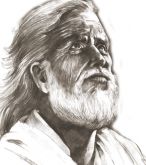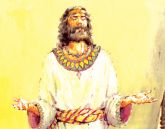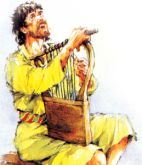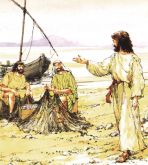×


We have detected your country as:
Please click here to go to the USA website or select another country from the dropdown list.
by: Rev. Cheryl L. Hauer, International Development Director

Sergey Nivens/shutterstock.com
The word relationship holds a place of centrality in Christian teaching. For millennia, the Church believed that it was set apart from all other faith systems, including Judaism, by that concept.
Christianity, the Church fathers determined, is not a religion of legalism or slavish commandment keeping and rote prayer; it is a religion of real and vibrant relationship with the one true God.
A look at our Hebraic foundations, however, may yield some surprising results as to who the Lord has been in relationship with and what that relationship looks like from His perspective.

Monkey Business Images/shutterstock.com
For most of us, our lives are really about relationship on many levels. We find fulfillment through marriage and as parents; we engage in social and professional interaction. We are aunts, uncles, grandparents, brothers, sisters, teachers, leaders and followers…an endless list of the reality of life, all based on relationship. And in a very real sense, our identity is found in those relationships. That should not come as a surprise, however, since as human beings made in the likeness of God, we were created for relationship. Bearing His image, we were never meant to live a solitary life.
Early in the book of Genesis, we are given a glimpse of a Creator God who fashions mankind from the soil of the earth because He longs for fellowship. The rest of the Book is, at its essence, about His attempts to bring mankind into relationship with Himself. He calls men His children, His spouse and His special treasure, but the most coveted title, seldom bestowed in Scripture, is that of friend.

ESB Professional/shutterstock.com
Since Yeshua, quoting from Deuteronomy 6, said that the two most important commandments are to love God with all your heart and love your neighbor as yourself, Christianity teaches that friendship is the second most basic relationship in life. The Gospels and the Writings of the Apostles are rife with references to the importance of fellowship, and offer a myriad of instructions on how to conduct oneself in such relationships.
Judaism also defines friendship as one of the primary relationships in life, a tie that at times exceeds that which bonds blood relatives. The ancient rabbis taught that a life without amiable companionship was not a life worth living. Friends were to offer each other help, loyalty, protection, support, unselfish love and moral guidance. The sages also stressed the influence friends have on one another, both good and bad. Pirkei Avot 2:13 says, “Come and learn—which is the straight path to which a person should adhere? A good friend.” Conversely, in 1:7 it says, “Distance oneself from a bad neighbor, and do not befriend an evil person.” In other words, choose your friends carefully, based not simply on who you are, but on who you aspire to become.
Webster’s Dictionary defines relationship as the state of being connected and friendship as the state of being attached to another by affection or esteem. The Bible uses a number of Hebrew words for friend or friendship with a variety of meanings ranging from passing acquaintance to intimate confidante, and several other words to communicate various aspects of such relationships. An exploration of the meaning of these words will give us a more biblical view of friendship. Perhaps the best way to understand friendship from God’s perspective, however, is to look at those He considered friends.
 Although God walked with Adam, Enoch and Noah, His first human friend according to the Bible was Abraham, a man called out of a gentile nation to become the father of the Jewish people. In 2 Chronicles 20:7, we find Israelite King Jehoshaphat, set upon by enemies on every side, crying out to God, “Are you not our God, who drove out the inhabitants of this land before Your people Israel and gave it to the descendants of Abraham Your friend forever?”(emphasis added).
Although God walked with Adam, Enoch and Noah, His first human friend according to the Bible was Abraham, a man called out of a gentile nation to become the father of the Jewish people. In 2 Chronicles 20:7, we find Israelite King Jehoshaphat, set upon by enemies on every side, crying out to God, “Are you not our God, who drove out the inhabitants of this land before Your people Israel and gave it to the descendants of Abraham Your friend forever?”(emphasis added).
The prophet Isaiah similarly refers to the descendants of “Abraham [God’s] friend.” In both instances, the word used for friend is ahav (אהב). In the Bible, it usually appears as a verb meaning to love, but in a few instances, it appears as a noun and relates to the especially close attachment of friends. It carries the connotation of strong emotional connection such as that found between parents and children or husbands and wives. The same word is used to describe David’s relationship with Jonathan and Abraham’s passion for his miracle son Isaac. Such love is rooted, however, in desire, a longing to be in the presence of the one loved.
Abraham was God’s “ahav,” the person He cared deeply about, loved like an only son, respected and admired, and most importantly couldn’t wait to spend time with. The two sat together, spoke with one another and even argued like only those who truly love and respect each other can. Their relationship would personify God’s instructions to Israel, “You shall love your neighbor as yourself…”(Lev. 19:18). Ahav was meant to be the normal state of affairs between men.
God’s next friendship was with the extraordinary prophet and leader, Moses. Exodus 33:11 tells us the Lord spoke to him face to face as a man speaks to his friend. The word used here is rea (רע) which means brother or companion, and in Song of Songs is translated husband and even lover. This was a relationship of remarkable depth and complexity. God so loved and respected Moses that He was willing to destroy the entire Israelite nation and start over with Moses and his offspring.
Moses knew God more intimately than any one man chronicled in the Scriptures. He spoke with God literally face to face, walked with Him, challenged Him and argued with Him…confrontations that caused Abraham’s disputes with God to pale by comparison. And like Abraham, he was not perfect. He sinned, disobeyed and rebelled. He lost his temper and behaved impetuously. Though God dealt with each of these incidents, His love for His friend was in no way diminished. With rea comes unshakable, irrevocable loyalty, a connection that cannot be broken.
 Although God does not expressly refer to King David as His friend, He does say in the Writings of the Apostles, “I have found David the son of Jesse, a man after My own heart, who will do all My will” (Acts 13:22).
Although God does not expressly refer to King David as His friend, He does say in the Writings of the Apostles, “I have found David the son of Jesse, a man after My own heart, who will do all My will” (Acts 13:22).
We find a similar statement in 1 Samuel 13:14, when the prophet, speaking of David, declares, “The LORD has sought for Himself a man after His own heart, and the LORD has commanded him to be commander over His people…” (emphasis added).
It is easy for us as Western thinkers to read these verses and minimize their depth of meaning. Heart for us relates primarily to emotions; David loves with the same passion as God. We might even take it a step further and determine that David has a “right” heart, that he is a man of integrity and obedience. However, the Hebrew word levav (לבב) and the Greek kardia (καρδία) both refer to the entirety of the inner man: his emotions, his knowledge and wisdom, his mind, his desires and inclinations, his thoughts, plans and actions. The heart stands for the man himself, not just a characteristic or two. As such, it is the fountain of all he does. All his thoughts, desires, words and actions flow from deep within him, from his “heart.” And David’s “heart,” sinful man that he was, was like God’s.
 How can this be? How can God say that a man who lied, committed adultery and ultimately murder, is like Himself? David lived a very difficult existence. He was the least among his brothers and was chased for years by King Saul whose jealousy was driving him to murder. His marriage to Michal was disastrous; he succumbed to temptation with Bathsheba, was hated by his own son and betrayed by trusted companions. Though we find all these stories in the books of Samuel and Kings, we find David’s levav in the Book of Psalms. Here we find a man of honesty, candidness, rawness and the courage to reveal his frailties and fears. We find a man of intense yearning to be close to God at all times, a man willing to expose himself without embarrassment and trust His God to be true to His promises. He was a leader and a fighter, a poet and a singer. He was a man of passion, love, trust and devotion, whose life was marked by humility. He wanted nothing more than to be in right standing with the God He loved, to confess his sins and bask in God’s forgiveness (Psalm 51), to be restored to purity–a heart like God’s.
How can this be? How can God say that a man who lied, committed adultery and ultimately murder, is like Himself? David lived a very difficult existence. He was the least among his brothers and was chased for years by King Saul whose jealousy was driving him to murder. His marriage to Michal was disastrous; he succumbed to temptation with Bathsheba, was hated by his own son and betrayed by trusted companions. Though we find all these stories in the books of Samuel and Kings, we find David’s levav in the Book of Psalms. Here we find a man of honesty, candidness, rawness and the courage to reveal his frailties and fears. We find a man of intense yearning to be close to God at all times, a man willing to expose himself without embarrassment and trust His God to be true to His promises. He was a leader and a fighter, a poet and a singer. He was a man of passion, love, trust and devotion, whose life was marked by humility. He wanted nothing more than to be in right standing with the God He loved, to confess his sins and bask in God’s forgiveness (Psalm 51), to be restored to purity–a heart like God’s.
The book of Ruth tells the beautiful tale of a young Moabite woman who forsook all to follow her Jewish mother-in-law to Israel. The rabbis teach that Ruth was actually a princess, the daughter of the king of Moab, raised with all the comforts of an ancient court. It stands to reason that Elimelech, who left Bethlehem as a wealthy man, could have associated with royalty, giving his sons the opportunity to meet and marry the daughters of the king.
Most Moabites, the sages say, were idol worshippers, depraved, uncouth, untrustworthy, and altogether an unpleasant lot. But Ruth was a woman of goodness, kindness, humility, gentleness, selflessness and integrity. She and her sister Orpah both had the opportunity to cleave to Naomi’s God, to leave Moab behind and follow Naomi home. Though it wasn’t an easy decision, Orpah ultimately rejected Him and went back. According to Jewish tradition what followed was a life of sin and degradation, guilt and rejection. Her depravity became too much even for the Moabites and she was forced to flee to Philistia where she would eventually become grandmother to Goliath.
Not so Ruth. Her devotion to Naomi and her willingness to follow her mother-in-law into very uncertain conditions in a land where her own people had been the hated enemy for generations makes her the personification of friendship. Her love was unconditional and sacrificial. She was Naomi’s ahav, her rea with a heart much like the one her grandson, King David, would someday possess.
But the real star of the show was actually Naomi. She had a difficult life in Moab, having left behind her friends, extended family and all that was familiar to follow her husband to an unknown land. There, her sons would marry foreign women from a culture that was drastically different from that of the Israelites. The social fabric of the Jewish people was inculcated with godly principles that were sorely lacking in any description of the Moabites.
Yet these three women would live together, work together, walk together for many years. Ruth and Orpah observed Naomi at the best of times and the worst of times, when things were good and when sorrow and death touched her life. And she had to have lived that life with such godliness, such faithfulness, such conviction that her actions told her daughters-in-law what relationship with God is all about. She, in a sense, made these young Moabite women jealous, engendering such desire that Ruth sought shelter under the wings of the God of Abraham, Isaac and Jacob.
Few stories in the Bible are quite as compelling as that of the prophet Hosea. Alive at a time when Israel had strayed from their God, he watched as moral depravity and idol worship engulfed his people, and his nation made alliances with neighboring pagan countries. It was a dark time in Israel’s history, when God began to speak to Hosea. The sages say Hosea was angry with Israel and sought God to do away with them and replace them with a new, faithful people. Instead, God instructed him to marry a prostitute. Hosea obeyed and took Gomer, a prostitute and the daughter of a prostitute, as a wife. They had three children, but Gomer was unfaithful and her lifestyle so questionable that, the sages say, Hosea couldn’t know if he had actually fathered them.

Aleksandr Markin/shutterstock.com
Finally, the Lord instructed Hosea to put Gomer away. But this time, Hosea wasn’t so quick to obey. By now, he had fallen deeply in love with his wayward wife, and the rabbis say he wept loudly before the Lord, begging that God would have mercy on his family. The Lord replied, “Hosea, she is a prostitute and you don’t even know if the children are yours, yet you love them and cry out for mercy. Israel is My beloved and the seed of Abraham, Isaac and Jacob, and you want Me to replace her with someone else! Should I not have the same mercy on them?”
It is at that point that Hosea recognized the compassion and faithfulness necessary to bear the burden of God’s heart toward Israel. The Hebrew word for faithfulness is emunah (אמונה). It is synonymous with righteousness, loving-kindness and justice. Hosea speaks of God’s relationship with Israel as a marriage and recognizes the pain of wounded love in the words God spoke. Yet even in the agony of betrayal, God calls out to His people, “I will betroth you to Me forever; Yes, I will betroth you to Me in righteousness and justice. In loving-kindness and mercy; I will betroth you to Me in faithfulness, and you shall know the Lord” (Hosea 2:19–20).
Despite their unfaithfulness, God would remain faithful. Even though He had to chastise them, He would not forsake them, nor desert them, nor allow them to suffer what the magnitude of their sins actually merited. He would keep His promises to them; the covenant would be established by God’s nature: He is faithfulness. And Hosea realized that he had to walk in that same emunah if he was to be the link between wayward Israel and the God who loved them.
 For Christians, the greatest expression of friendship is seen in Yeshua (Jesus). As He walked the highways and byways of ancient Israel, He exhibited passion, love, trust and devotion, and a life marked by humility. He was a constant visible expression of God’s heart. He lived sacrificially, healing the sick, giving sight to the blind and hearing to the deaf. He raised the dead, comforted the hurting and embraced those who others found totally unlovable.
For Christians, the greatest expression of friendship is seen in Yeshua (Jesus). As He walked the highways and byways of ancient Israel, He exhibited passion, love, trust and devotion, and a life marked by humility. He was a constant visible expression of God’s heart. He lived sacrificially, healing the sick, giving sight to the blind and hearing to the deaf. He raised the dead, comforted the hurting and embraced those who others found totally unlovable.
In the Torah [Gen.–Deut.] a recurrent refrain describing God’s nature is “abounding in chesed” (חסד). Most often translated loving-kindness, it is one of the most important words in the vocabulary of scriptural theology and ethics. It speaks of God’s extravagant love and generosity, abounding loyalty and mercy, personal commitment and devotion. It is sometimes translated steadfast love, steadfastness, favor or love, but always in terms of covenant commitment.
According to Vine’s Expository Dictionary of Hebrew Words, even Creation is the result of God’s chesed. His love lasts for a thousand generations, indeed forever. The entire history of His covenantal relationship with Israel can be summarized in terms of chesed. And according to the Writings of the Apostles (Eph. 2:13–22), Yeshua opened the door for Gentiles to be grafted into that covenant. In John 15:13, He declared, “Greater love has no one than this, than to lay down one’s life for his friends.” He is the personification of chesed, and He was faithful unto death. Today He constantly intercedes for us, His friends.
The following story was told by the sages to express the importance of friendship:
Once there lived a Gentile king who delighted in having an audience with a particular rabbi who lived in his kingdom. The two would talk endlessly on various subjects and the rabbi’s sharp intellect amazed the king. No one could compare in wisdom to the rabbi who repeatedly reminded the king of God’s providence.
The king had a fascination with adventurous outings and he often invited the rabbi to accompany him. On one such outing, the king decided he wanted to go hunting. The rabbi had not been hunting before and in his clumsiness with the unfamiliar gun, he accidentally shot the king. The king’s hand was permanently damaged as the shot completely severed one of his fingers.
Enraged, the bleeding king had his guards throw the rabbi immediately in prison, ordering him to the deepest and darkest of the dungeon’s chambers.
Months passed and the king’s injury slowly healed. Once he was strong enough, he set out on an extravagant trip to far off lands. In one exotic location, the king was warned not to leave the camp because hostile natives lurked about in the dark. But he couldn’t resist the temptation to see for himself. On one of his forays outside the camp, he was captured by cannibal tribesmen. Before throwing him into the cauldron filled with boiling water, they stopped to examine their pending dinner. When they discovered he was missing a finger, they were aghast. This was an evil omen, and they immediately returned the king to his campsite.
He was overjoyed and immediately thought of the rabbi whose “blunder” had saved his life. He changed course and returned home, eager to speak to his friend. The rabbi was promptly set free and the king asked him:
“Dear rabbi, you have always spoken of divine providence and how everything comes down from heaven for our good. And I finally understand. But rabbi, I have one question: what was the divine providence as it related to you? You were in the dungeon for months! Where is the good in that?”
The rabbi smiled as he answered, “Your majesty, if I hadn’t been in the dungeon, I would have been with you. And I have ten fingers…the cannibals would have eaten me!”

hxdbzxy/shutterstock.com
I think for us there are deep lessons to be learned from the rabbi and the king. First, it is imperative for all of us that we seek the friendship of the ultimate King, the Creator of Heaven and earth.
Since He is the only true and righteous friend, filled with love and grace and mercy, since He is chesed and emunah, He desires to be our brother and our companion, our husband and our lover.
Therefore, we must do two things:
Are we willing to surrender our lives to God’s chesed and let Him mold us into real friends, with hearts after His own, whose lives are true reflections of the King?
Cheryl. “Hosea: Yesterday’s Answers for Today’s Questions,” Israel Teaching
Letter, January 2012, Bridges for Peace, https://www.bridgesforpeace.com/
il/teaching-letter/article/hosea-yesterdays-answers-for-todays-questions
—— “Ruth, Mother of Royalty” Israel Teaching Letter, September 2012, Bridges
for Peace, https://www.bridgesforpeace.com/il/teaching-letter/article/ruth-mother-
of-royalty
Lieber, Rabbi Moshe. The Pirkei Avos Treasury. New York: Mesorah
Publications Ltd, 1995.
Schram, Peninnah (ed.). Stories within Stories, from the Jewish Oral Traditions.
Northvale NJ: Jason Aronson, Inc., 2000
Vine, W. E.; Unger, Merrill; White, William, Jr. (eds.). Vine’s Expository Dictionary of
Biblical Words. Nashville, TN: Thomas Nelson Publishers, 1990.
All logos and trademarks in this site are property of their respective owner. All other materials are property of Bridges for Peace. Copyright © 2024.
Website Site Design by J-Town Internet Services Ltd. - Based in Jerusalem and Serving the World.